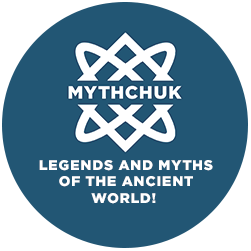Pandora’s Myth: Creation, the Jar, and the Gift of Hope (Pandora’s Box)
- Main
- >
- Greek Mythology
- >
- Greek Heroes and Characters
- >
- Pandora’s Myth (Pandora’s Box)
They created her, they sent her as a gift—and she brought to the world… But you’ll find out at the end.
Pandora — the first woman in Greek mythology, created by Zeus’s command. Her name means “All-gifted.” She became famous for opening the jar (in Greek, pithos; later mistranslated as “Pandora’s box”), from which all human evils escaped. Her story isn’t about evil, but about fate, submission to the gods’ will—and an unexpected gift: Hope.
 Pandora’s Myth (Pandora’s Box)
Pandora’s Myth (Pandora’s Box)Why Pandora Came to Be
It all began with Prometheus—the Titan who stole fire from the gods and gave it to men. In Hesiod’s Theogony and Works and Days, Zeus could not forgive such defiance. He decided to punish humanity, not with war or lightning, but with a gift that would undo what Prometheus had given.
Hence came Pandora—not as a blessing, but as a subtle punishment and temptation meant to unravel what Prometheus had done.
 Pandora
PandoraThe Making of Pandora
Almost every god contributed to her creation, as Hesiod writes:
- Hephaestus shaped her from earth and water;
- Athena endowed her with womanly skills and clothes;
- Aphrodite gave her beauty and charm;
- Hermes bestowed cunning, persuasion, and a deceitful tongue;
- Apollo gave musical ability;
- and Zeus instilled in her insatiable curiosity.
Thus she was called Pandora—“all-gifted.” She was born not to live, but to become legend.
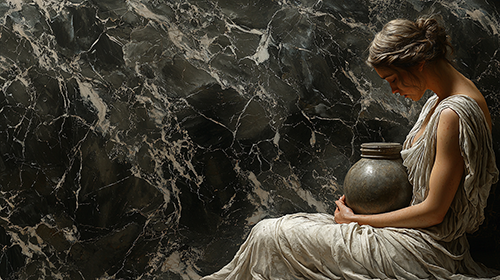 Pandora and jar
Pandora and jarA Gift That Was Not a Gift
Zeus entrusted Pandora with a container—a pithos, a large clay jar later called the “box.” Its contents were unknown to her; she was not supposed to open it. Yet this was exactly what Zeus hoped would happen.
He sent Pandora to Epimetheus, Prometheus’s brother. Despite Prometheus’s warning not to accept gifts from Zeus, Epimetheus was entranced by her beauty and took her as his wife—sealing humanity’s fate.
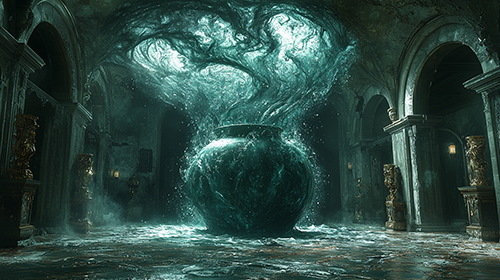 Opening the Jar (Pandora’s Box)
Opening the Jar (Pandora’s Box)Opening the Jar (Pandora’s Box)
At the critical moment, Pandora—driven by curiosity installed by the gods—opened the jar. All of humanity’s ills flew out: disease, old age, death, envy, anger, hunger, suffering, lies, war... Everything humans had never known, since Prometheus’s fire had brought them a simple peace.
Hesiod writes that only one thing remained inside: Elpis, Hope. She shut the jar in time. But now the question before us: was Hope a gift—or part of the curse?
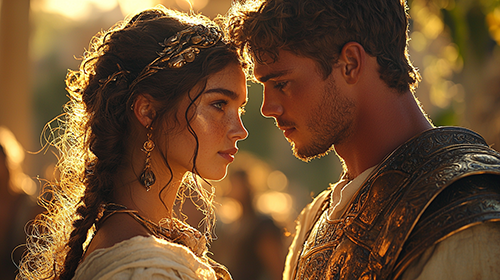 Life with Epimetheus
Life with EpimetheusLife with Epimetheus
Pandora became Epimetheus’s wife. Little is known of their life, but Hyginus adds that they had a daughter, Pyrrha, who married Deucalion and became the mother of the new human race after the Great Flood. Thus, Pandora is the matriarch of humanity in Greek myth. If her creation was punishment, her lineage was renewal—and after all the evils, she left the world with something more valuable than strength: a future.
 Her beauty is a trap
Her beauty is a trapHow Her Image Evolved
In Hesiod’s portrayal, Pandora is complex—not evil, but a tool. Her beauty is a trap; her act follows her creation. She isn’t rebellious or sinful—she’s carrying out someone else’s will.
Later, in Roman and early Christian retellings, she became likened to Eve, the woman who brought sin into the world—but this is not the ancient Greek view. In classic sources, Pandora isn’t the source of evil, but the catalyst for change: humanity’s awareness of vulnerability and power.
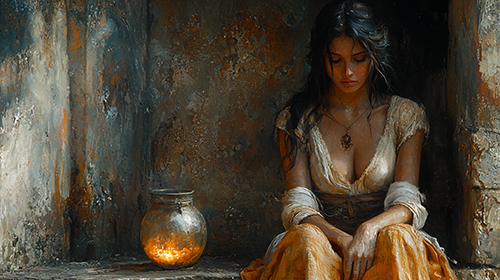 Hope Inside the Jar
Hope Inside the JarWhat About the Hope Inside the Jar?
When Pandora opened it, all evils escaped, but Hope remained—Hesiod writes Works and Days: “Only Hope was left… under the lid.” Why?
Some Greek thinkers believed Pandora shut the jar just in time, keeping Hope inside—unavailable to humankind. Others argued that Hope remained in the world because it didn’t escape with the evils—thus salvation remained. And still others felt that Hope inside the jar represented false hope—an illusory comfort placed by the gods to mock humanity.
There’s no single answer. But if you were asked—what’s worse: a world with evils and Hope, or one without Hope at all? Perhaps Hesiod leaves that to your imagination.
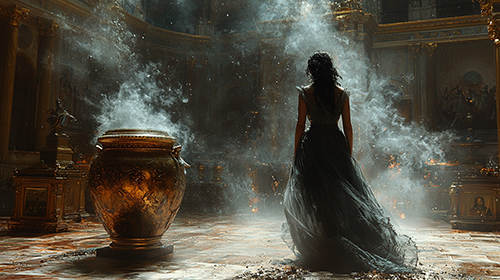 Pandora’s Box
Pandora’s BoxPuppet of the Gods
Pandora: the first woman, made by the gods. She was not born, and had no destiny of her own—only divine purpose. Her story is paradoxical: both guilty and innocent. She opened the jar that changed the world—but she also left us Hope.
Her symbols—jar, charm, curiosity, divine gifts—live on in philosophy, art, psychology. “Pandora’s box” is now shorthand for unleashing unstoppable consequences. But one thing often forgotten: Pandora didn’t just let evil into the world—she left behind the last thing that never disappears… Hope.
